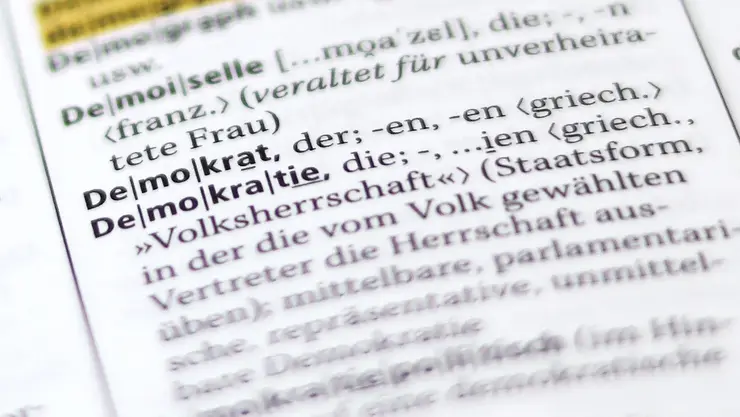Democracy and Economy
Course details
The Master's programme Democracy and Economics combines two disciplines of political science:
- Social sciences (political science, sociology) and
- economics.
Students should be enabled to independently analyse the mutual relations of democratic and economic orders, based on political science and economics as well as interdisciplinary reflection, with special consideration of their specific actors, organisations and institutions, logics of action, opportunity structures and practices as well as historical, cultural and situational contexts.
The research-oriented Master's programme teaches subject-specific and interdisciplinary methods, theories and specialised knowledge as well as their application-related implementation. This sets the content-related prerequisites for successful participation in relevant doctoral programmes in political science and economics, but also imparts competences for demanding, especially science-related professional fields at the interfaces of politics and economics.
Special features of the Master's programme "Democracy and Economics" in distinction to similar interdisciplinary programmes and also the Erfurt Master's programme "Economics, Law and Social Sciences" are:

Entry areas in the other subject
For students who have obtained a disciplinary Bachelor's degree exclusively in political science or economics, entry-level areas are integrated into the study programme in which they catch up on the fundamentals of the respective other subject relevant for the Master's degree within the first semester.

Interdisciplinary modules
The topic modules always consist of a political science and an economics sub-module and are consistently structured in an interdisciplinary manner.

Training in quantitative and qualitative methods as well as "fast track" doctorate
The research orientation is reflected, among other things, in the compulsory training in quantitative and qualitative methods, the two to three written papers with a high workload (12 LP/ECTS each) and the "Fast Track" programme for the doctorate, in which outstanding students write a Master's thesis that prepares them for a subsequent doctorate under the supervision of a professor.
Job & Career Perspectives
Thanks to the interdisciplinary orientation, as a graduate you will have a broad, theoretically and methodologically founded perspective in the two political sciences of economics and social sciences. On the other hand, the individual options of the interdisciplinary topic modules open up the possibility for you to specialise according to your interests.
The thematic focus on the interfaces between politics and economics creates attractive and increasingly demanded professional fields, especially in the areas of:
- Economic and political consulting in NGOs,
- public administration,
- government staffs,
- companies and
- associations.
The Master's programme "Democracy and Economics" also prepares students for jobs in academia (with an interdisciplinary profile) and research-related professions at the interface of politics and economy.
To facilitate a seamless transition into professional life, the Master's thesis can be written in cooperation with a research institution or a practice partner.
Democracy and Economics in detail
Structure of the study programme
The four-semester standard period of study of the Master's programme "Democracy and Economics" comprises a three-semester study phase (90 LP/ECTS) and one semester for writing the Master's thesis (30 LP/ECTS). The Master's programme can only be started in the winter semester.
The programme is divided into:
- disciplinary entry modules,
- disciplinary core modules,
- interdisciplinary topic modules,
- the final module with research colloquium and Master's thesis.
The six core modules of the three core areas:
- Empirical Methods,
- Ideas and Institutions of Democracy, and
- Management and Organisational Leadership
totalling 36 LP/ECTS must be completed as compulsory modules.
Students who take up the degree programme after an interdisciplinary Bachelor's degree in Social Sciences and Economics:
- must take three of the five subject modules, each worth 18 LP/ECTS, as compulsory elective modules.
Students entering the programme after a disciplinary Bachelor's degree:
- must take the three introductory modules specified in the notification of admission (in the case of a disciplinary BA degree in Social Sciences: the three introductory modules in Economics, in the case of a disciplinary BA degree in Economics: the three introductory modules in Political Sciences) totalling 18 LP/ECTS in their 1st year of study. You must also take two of the five subject modules, each with a total of 18 LP/ECTS, as compulsory elective modules.
"Fast track" to doctorate
Particularly qualified students can apply for admission to a "Fast Track" programme for a doctorate as part of their Master's programme from the 3rd semester onwards. The application must be submitted to the responsible Master's programme officer by 15 July or 30 January of each year and will first be decided on by the Master's examination committee and, in the case of a positive vote, by the doctoral committee of the Faculty of Economics, Law and Social Sciences at the latest four weeks before the start of lectures. The documents to be attached to the application are listed in the examination regulations.
In the 4th semester, students admitted to the "Fast Track" programme complete a Master's thesis that justifies acceptance as a doctoral candidate with a topic based on the content of the Master's thesis. The doctoral committee of the Faculty of Economics, Law and Social Sciences decides on the basis of the corresponding doctoral regulations of the faculty whether acceptance as a doctoral candidate can be pronounced at the same time as completion of the Master's programme.
Internship
You have the opportunity to take internships worth 6 credit points as part of your degree programme. But a maximum of one module can be brought in as an internship to the extent of 6 LP.
Study abroad
A semester abroad in an English-speaking country is strongly recommended. The International Office will gladly assist you in organising your stay abroad.
Admission requirements
-
an above-average Bachelor's degree in the subject Social Sciences or Economics (or comparable subjects) or
an interdisciplinary Bachelor's degree in Social Sciences and Economics with at least 60 LP/ECTS in one subject and a further 30 LP/ECTS in the other subject, or
a disciplinary Bachelor's degree with at least 90 LP/ECTS in the respective field of study. -
Since the Master's programme "Democracy and Economics" requires familiarity with empirical research methods, graded basic knowledge of quantitative research methods or statistical procedures to the extent of 12 LP/ECTS must be demonstrated before commencing the programme.
The examination board decides on exceptions to the above-mentioned course-related requirements.
Language requirements
The languages of instruction in the Master's programme are German and English.
- German: Upon application, international applicants must prove German language skills at level B1.
A very good knowledge of English is required; proof can be provided upon application for admission by:
- TOEFL iBT: mind. 80,
- IELTS: mind. 6,5 oder
- comparable, as well as Abitur certificate with continued foreign language English according to EPA.
Language Centre
The Language Centre offers around 140 language courses per semester in 16 modern and ancient (foreign) languages. It supports you in acquiring and improving your language skills.
Language Centre
International applicants
International applicants whose native language is not German must provide proof of sufficient German language skills (level B1) upon application.
Information on required German language skills and the German language test for university admission (DSH):
Open Day

Open Day
Numerous information and advisory services offer the opportunity to personally convince yourself of the study and living conditions in Erfurt at the open day. Get to know the green campus and the beautiful old town centre on guided tours. Information about the programme: Open Day
Order or download information material
Would you like to receive the programme flyer? Then request our free information materials without obligation. In a few days you will receive mail directly to your home.
You don't want to wait? Then download the flyer now in the Download Centre.
Similar courses of study
These study programmes might also interest you
Master's programme Public Policy
Application
The recommended application period for the Master's programme in Democracy and Economics is from 1 January to 15 July for the winter semester. *)**)
*) If your application is received by 15 July, the University of Erfurt will endeavour to inform you of the admission decision promptly after reviewing your application. By accepting the place, you can enrol immediately.
**) If we do not receive your application until after the recommended deadline of 15 September at the latest, we cannot guarantee that your application will be processed promptly; the last time decisions on admission are made is in the week before lectures begin.
Information on application deadlines and application modalities, admission, enrolment can be found at:





